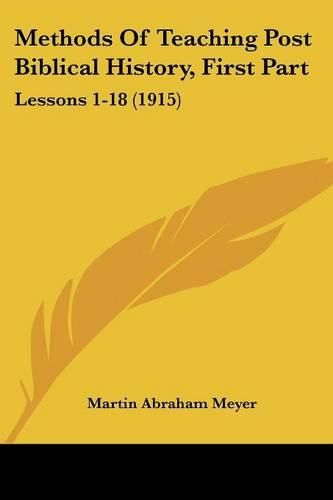Readings Newsletter
Become a Readings Member to make your shopping experience even easier.
Sign in or sign up for free!
You’re not far away from qualifying for FREE standard shipping within Australia
You’ve qualified for FREE standard shipping within Australia
The cart is loading…






Purchase of this book includes free trial access to www.million-books.com where you can read more than a million books for free. This is an OCR edition with typos. Excerpt from book: Lesson II The Pupils and Some of Their Needs Lesson II. THE PUPILS AND SOME OF THEIR NEEDS The teacher must know and understand his pupils. He must study them as a group and as indi- cent pupil viduals. He must know their peculiarities and be ready to meet their needs. The whole success of the teaching depends upon this. The curriculum of the Jewish religious school is generally so arranged as to reserve the teaching of the Post-Biblical period of Jewish history for the senior grades, which in many schools form the Confirmation and Post-Confirmation Classes. The lessons in this course will be arranged to meet the needs of a two years’ course of instruction. This arrangement of the curriculum means that the teacher will deal with a different type of child life and mind than that met in the younger classes. The usual age of confirmation is that at which the boy and girl pass out of childhood and enter into what is known as early adolescence. The teacher would do well to instruct himself in the psychology of this period. (See G. Stanley Hall, Adolescence, 2 vols.) The docility of the child now gives way to the self-assertiveness of youth. Children are restless in this period, impressionable, given to day-dreams, to love of adventure, physical and spiritual. It is the age of chivalry. The altruistic virtues make their first appearance under the stress of the expanding self. It is a critical time. The man is emerging; the girl is passing into young womanhood. Repression and suppression are difficult. Nagging at such a timewill absolutely spoil the emerging self. The wise teacher will study his pupils and learn how to divert this restlessness into helpful and constructive activity. It is evident that the instruction in these classes must be along other lines than those fo…
$9.00 standard shipping within Australia
FREE standard shipping within Australia for orders over $100.00
Express & International shipping calculated at checkout
Stock availability can be subject to change without notice. We recommend calling the shop or contacting our online team to check availability of low stock items. Please see our Shopping Online page for more details.
Purchase of this book includes free trial access to www.million-books.com where you can read more than a million books for free. This is an OCR edition with typos. Excerpt from book: Lesson II The Pupils and Some of Their Needs Lesson II. THE PUPILS AND SOME OF THEIR NEEDS The teacher must know and understand his pupils. He must study them as a group and as indi- cent pupil viduals. He must know their peculiarities and be ready to meet their needs. The whole success of the teaching depends upon this. The curriculum of the Jewish religious school is generally so arranged as to reserve the teaching of the Post-Biblical period of Jewish history for the senior grades, which in many schools form the Confirmation and Post-Confirmation Classes. The lessons in this course will be arranged to meet the needs of a two years’ course of instruction. This arrangement of the curriculum means that the teacher will deal with a different type of child life and mind than that met in the younger classes. The usual age of confirmation is that at which the boy and girl pass out of childhood and enter into what is known as early adolescence. The teacher would do well to instruct himself in the psychology of this period. (See G. Stanley Hall, Adolescence, 2 vols.) The docility of the child now gives way to the self-assertiveness of youth. Children are restless in this period, impressionable, given to day-dreams, to love of adventure, physical and spiritual. It is the age of chivalry. The altruistic virtues make their first appearance under the stress of the expanding self. It is a critical time. The man is emerging; the girl is passing into young womanhood. Repression and suppression are difficult. Nagging at such a timewill absolutely spoil the emerging self. The wise teacher will study his pupils and learn how to divert this restlessness into helpful and constructive activity. It is evident that the instruction in these classes must be along other lines than those fo…